Well now, here we all are, to a degree more or less according to our exact location, firmly in Quarantine, a condition once described by a 19th century travel guide to the East as “Imprisonment, with a chance of catching the plague.” Forty days seclusion was applied then, if you crossed the river at Belgrade from the Ottoman Empire. Under this month’s yellow flag rules, those of us in English Gloucestershire (tier three) must again desist from travelling into Wales, although those living in Herefordshire (tier two) might do so. From a fishing point of view, this was hardly relevant because continual rains and floods put paid to nearly all fishing opportunities during December anyway. And, from Boxing Day on, shooting was apparently off too, as was going out for a coffee or to the pub for a pint, with or without a scotch egg. At the end of the year Gloucestershire was entering tier four. It’s quite a strain keeping up with it all. Oh and, by the way, we left the European Union at last.
Grayling fishing reports this month are accordingly meagre. On the 2nd of December GE from Cardiff with a friend took 12 grayling from the Wye at Abernant, both by trotting bait and with the fly rod. Lady Alexander Catch earned high marks from GE, but not the path leading to the upper part of the beat, which he found difficult. I agree with him; you need to be young and agile for that goat track. Be careful on the steep bits, particularly so if the river is running high. In rather similar vein, AA from Crickhowell experienced a difficult time at Lower Glanwye on the 3rd. The river was already high, rising and colouring, it was actually snowing, and the access proved really problematic. The upper part of this beat, rocky, awkward, tucked under the trees alongside the road, is certainly not an easy wade. Regular salmon anglers here know how to extract fish in season from some of these difficult places, but winter grayling fishers might do best to concentrate on the long gravel run at the bottom end. KB from Brecon (who has just moved to Talybont-on-Usk) had a very different experience on his first visit to the Irfon at Cefnllysgwynne. This was on Sunday 13th, so conditions were hardly ideal: heavy rain during the morning and by dusk the Irfon was in full flood with 1.8 metres on the gauge. Still, by trotting maggots in the slacks in the lower part of the beat he had 5 grayling and by his own account KB had a wonderful afternoon. You should read his report; it is quite charming.
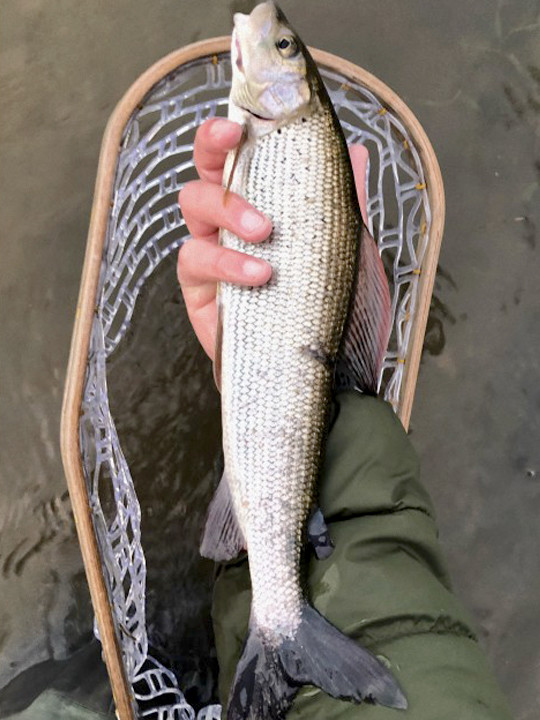 Abernant grayling - RS from Swansea
Abernant grayling - RS from Swansea 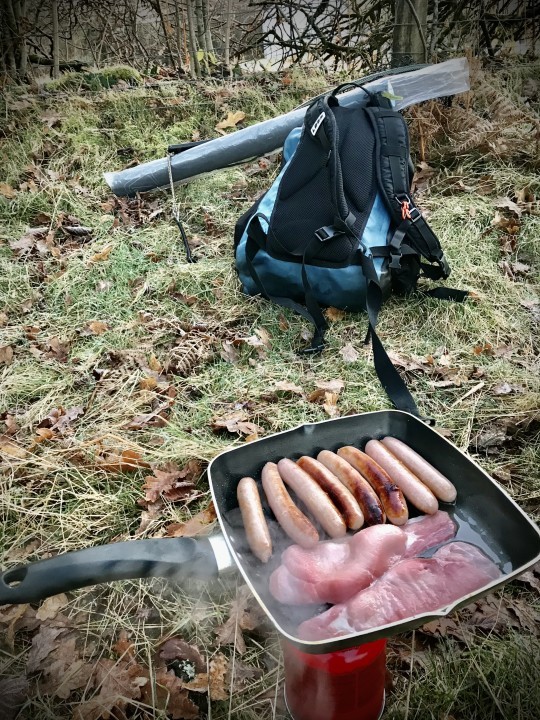 Grayling fishers' lunch - JC from Abergavenny
Grayling fishers' lunch - JC from Abergavenny 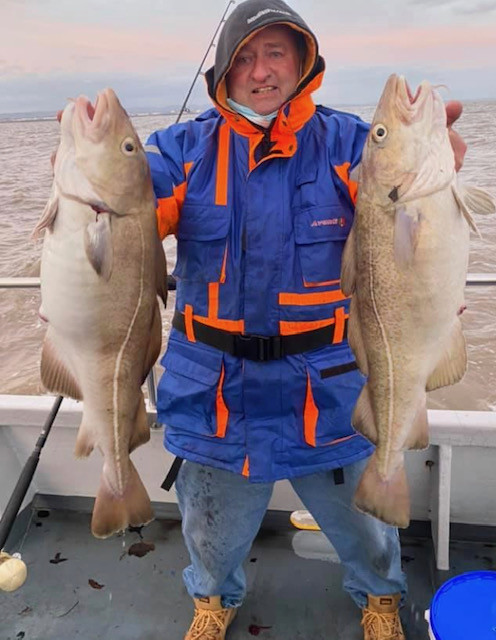 Bristol Channel cod - photo Nigel Powell
Bristol Channel cod - photo Nigel Powell Rain continued to fall and the rivers to rise even higher, bringing all our grayling fishing plans to nothing. A few Wye coarse fishermen showed again what they can do in these circumstances. NB from Stratford-upon-Avon who took 6 barbel at How Caple Court on the 19th: “…caught the Wye just right as it burst its banks today.” He was fishing from the path in several inches of water while the field flooded behind him. During these heavy winter floods, inevitably we start to think about redd wash-outs, imagining salmon and trout eggs being ground in a mill of rolling gravel and stone before the remnants are washed away. I don’t know if there has been or could ever be a scientific study of what happens to fish eggs when the river rises a couple of metres or more, but we can guess. Heavy rain continued most days. On Christmas Eve, when many Gloucestershire roads were closed by water and fallen trees, even the little Bideford Brook rose out of its channel to spread across the fields. The still waters also, with the exception of a couple of spring-fed pools, were coloured thick reddish brown through surface run-off and silt carried in by the feeder streams. The long range weather forecast for next month seems to be much colder and drier, so if we are allowed out we may yet get some good winter fishing.
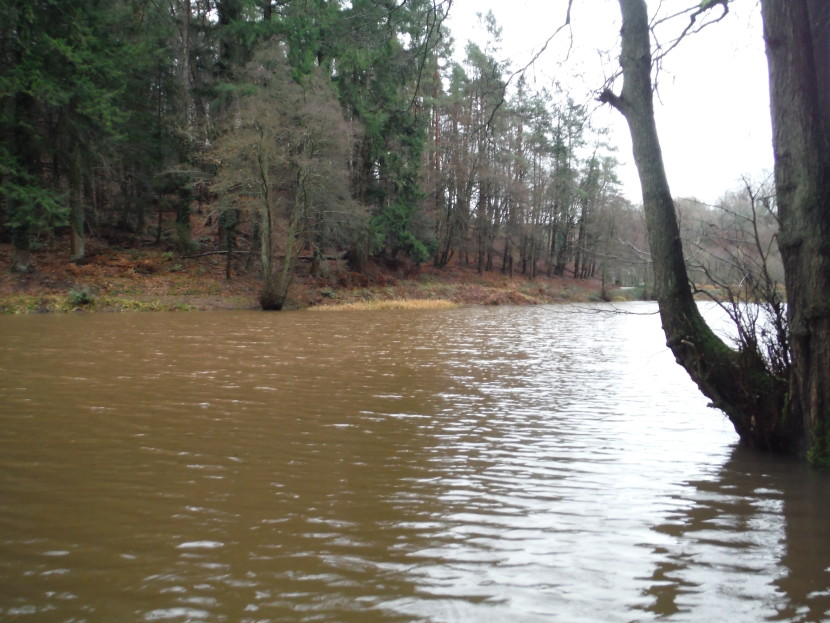 A pool full of mud
A pool full of mud 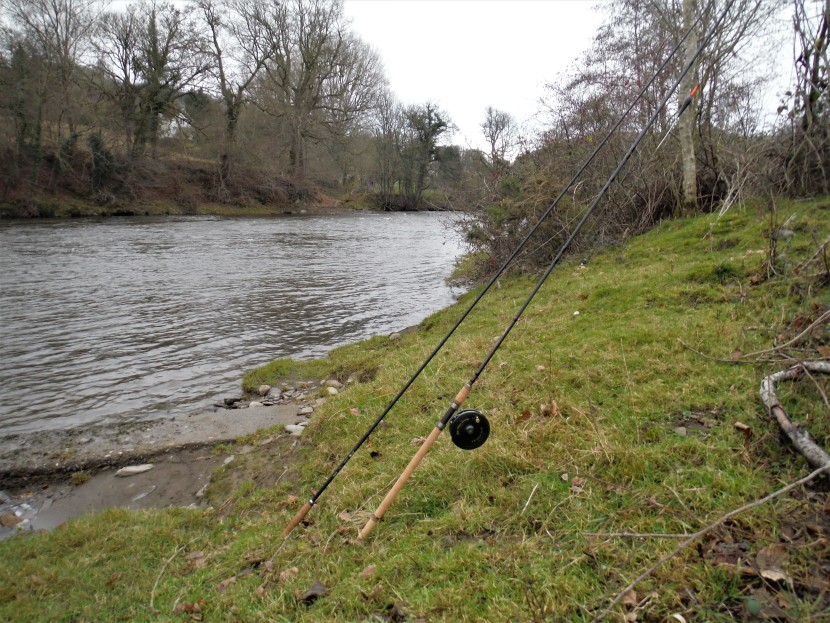 A trotting day in winter
A trotting day in winter 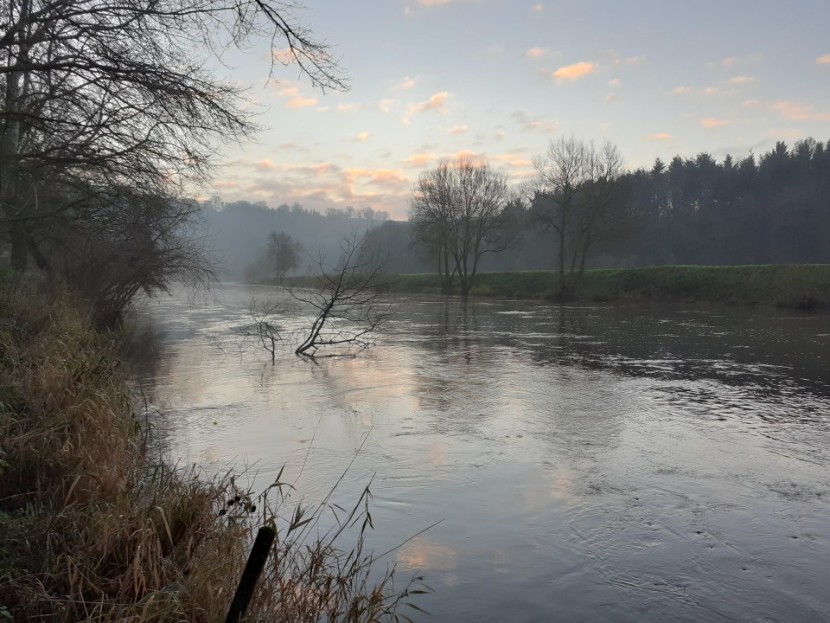 High water coarse fishing on the Middle Wye - S from Devon
High water coarse fishing on the Middle Wye - S from Devon 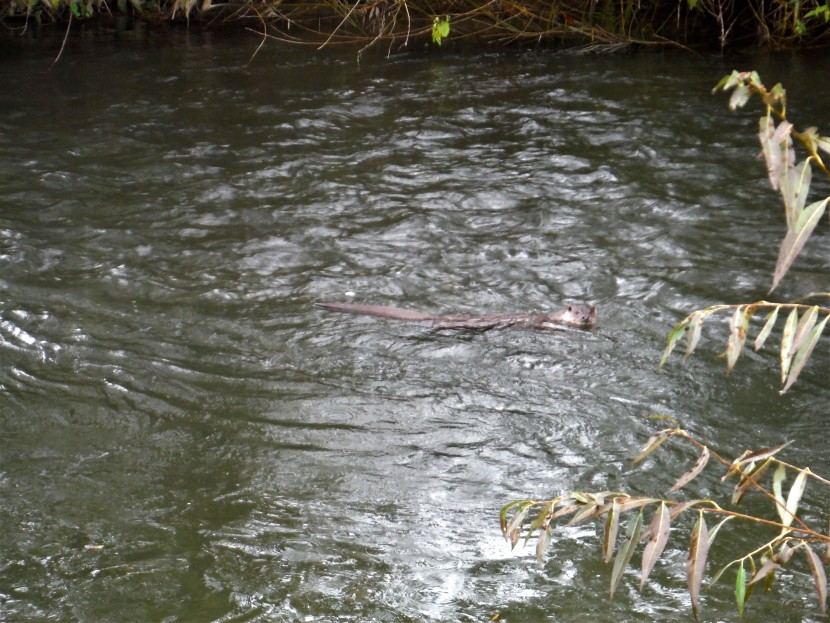 Just before the bulldozer arrived - an otter fishing in the section of the Lugg that was dredged a few days later
Just before the bulldozer arrived - an otter fishing in the section of the Lugg that was dredged a few days later As if this difficult year has not been problematic enough, on December 3rd we heard some very grim news indeed. This involved the unauthorised dredging of about 1.5 km of the river Lugg near Kingsland, turning it into something like a canal. Days before, this had been a classic and beautiful section of alder-fringed border stream with a normal healthy sequence of pools and riffles which supported a variety of wild life.
The photograph below says it all. Although it caught us by surprise, there is quite a lot that we now know about what happened here. At the same time there is a huge row developing about the damage to the stream which is being fully publicised by the local Herefordshire press and social media. The aftermath investigation already involves various agencies including the police, the EA, even the local parish council. For now I have been asked not to give more details as this might prejudice ongoing investigations and a likely prosecution. I do very much hope the law will react firmly in this case. The photograph right, of an otter fishing in high water, was taken on the section in question just a couple of days before the bulldozer came to destroy it.
 Devastated Lugg
Devastated Lugg Also this month and continuing the gloomy mood, following a campaign by the WUF and having carried out a survey of its own, the NRW admitted that phosphate levels in the Wye are indeed much too high. So much is welcome, but what I do not understand is what exactly is to be done about it? An aim to ensure any future projects granted planning permission will be at least carbon neutral is not enough; simply maintaining the status quo will not prevent the continuing damage to the ecology of the river.
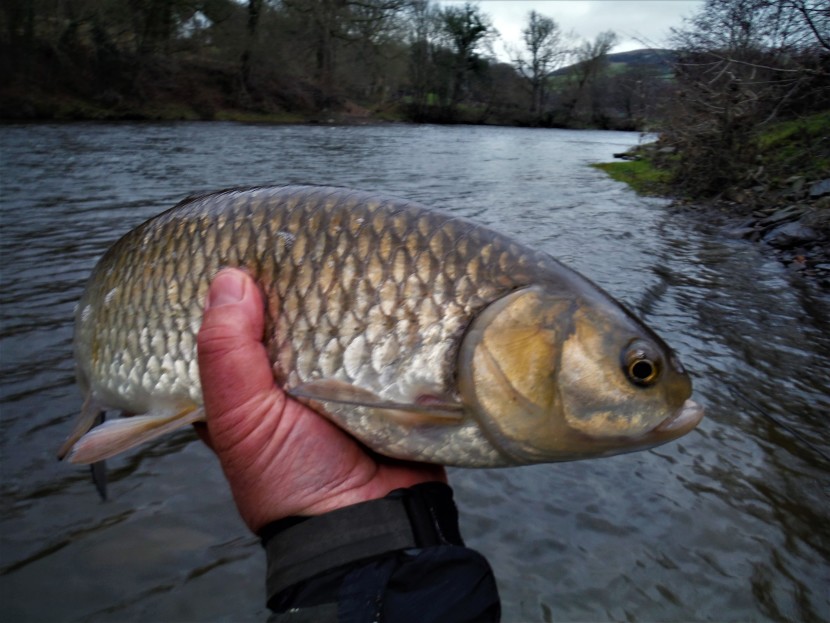 Interloper -upper Wye chub taken while grayling trotting
Interloper -upper Wye chub taken while grayling trotting 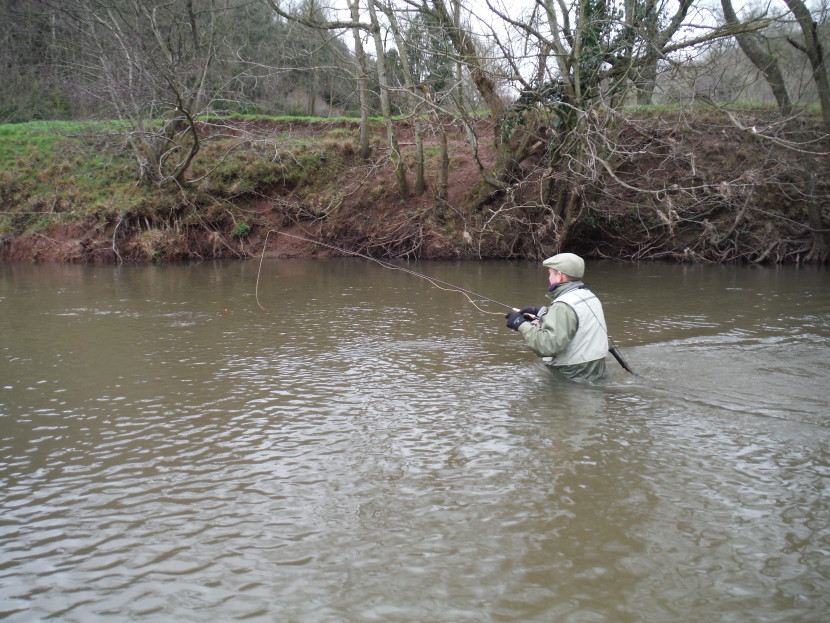 Plumbing the depths for Monnow grayling
Plumbing the depths for Monnow grayling 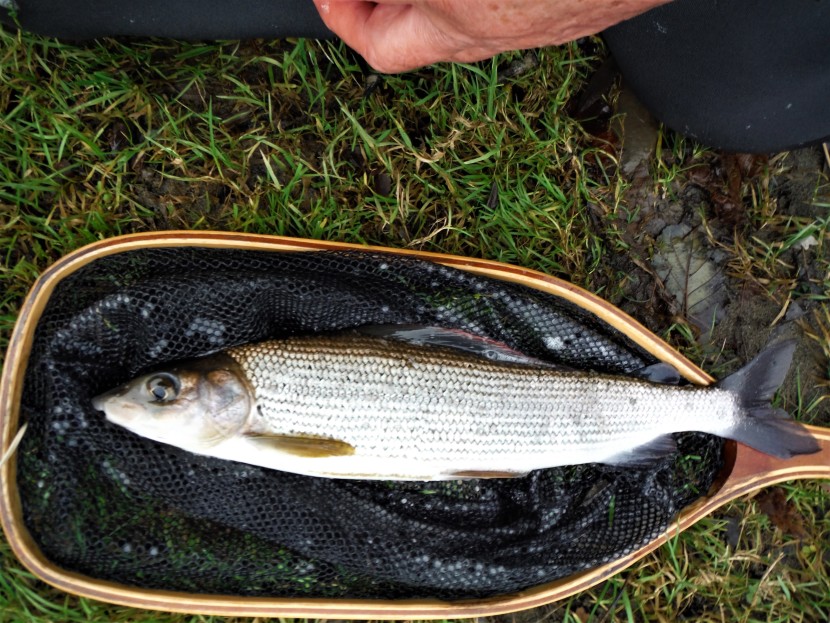 Typical Wye grayling - note the slightly worn lower lobe of the caudal fin from resting on the bottom.
Typical Wye grayling - note the slightly worn lower lobe of the caudal fin from resting on the bottom. To finish off this strange and difficult year of 2020, here are “five easy pieces” on various subjects taken from my note-book:
One. The leaves are just about gone and the days are short. The rich forest colours around us have dwindled now to shades of sepia. With the Wye in flood for many days I fish regularly on lakes, although even those are thickly coloured at times. There is always plenty to look at and more to do than just fishing during winter mornings on our Forest pool. The birds seem to change every year. The mallard are always present, along with the water hens and kingfishers, but for some reason there are no coots this year. I am grateful that we haven’t seen cormorants for a while but I expect goosanders if the weather grows colder. On the feeder stream you can usually come across a dipper or two. There is no shortage of nymphs and shrimps for them to feed on. In fact dippers have done well on all the forest streams in recent years, having been given a little human help in the form of nest boxes under bridges. Wagtails, yellow and pied, keep them company and share their relative tolerance of humans. Old Nog the heron is usually around the top of the lake in the early morning, although he keeps his distance and usually flies off down the valley with deep croaks when I show up. We had a younger bird on the lake last summer, who for some reason was much less shy of humans. One day we were almost standing fishing in each other’s pockets. I also notice the dabchicks, more formally known as lesser grebes, have unaccountably been very successful in breeding recently and we have a lot of them this season. They dive constantly. If your eye misses them going under, it is easy to imagine the spreading rings left behind were made by a rising trout. Then the little fellow comes up a few yards away, perhaps with a stickleback in his bill. Beware, because the dabchick may well take your sub-surface fly if you don’t pay attention. The other day I experienced a strangely soft take and then pulled a dabchick to the surface, not hooked but hanging stubbornly onto the tail of a Black Widow lure. He gave me an old-fashioned look and let go.
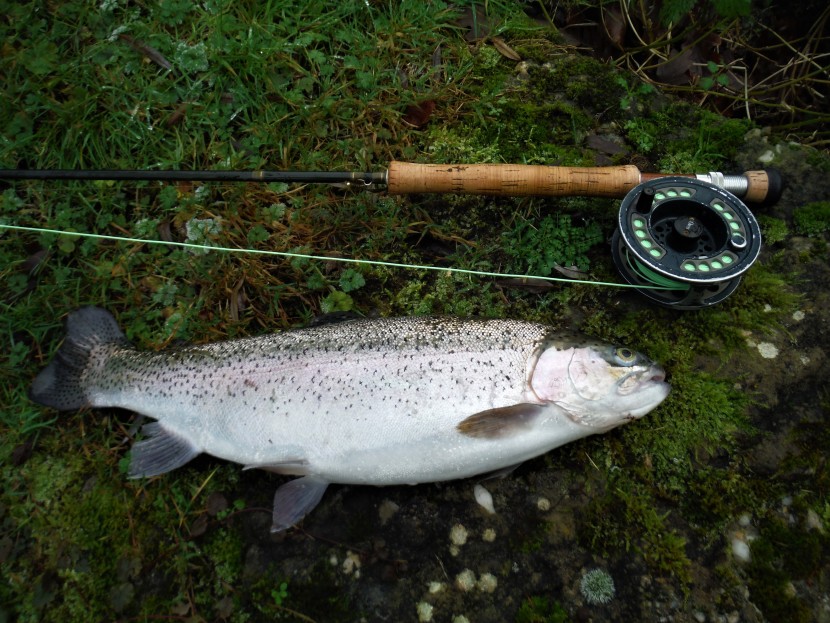 This rainbow was lying in a flooding inlet stream
This rainbow was lying in a flooding inlet stream 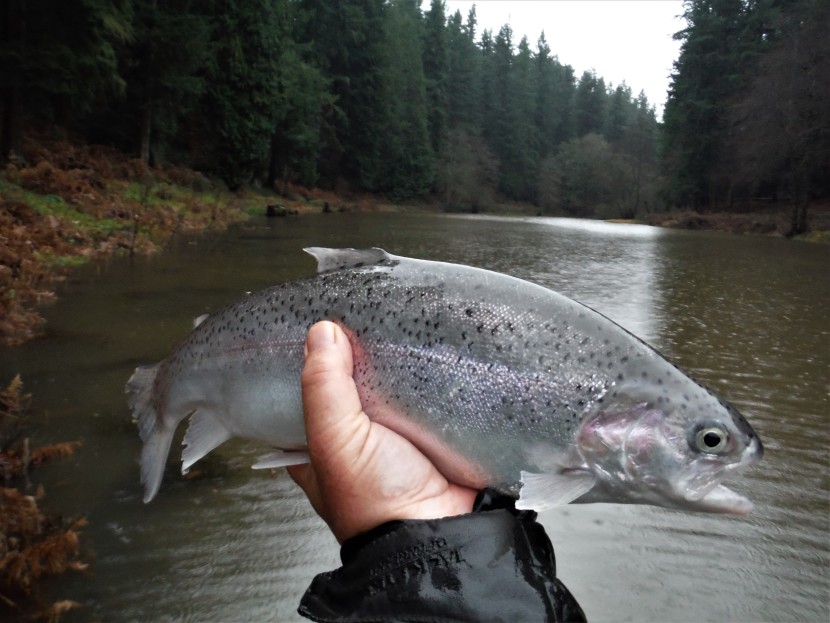 Rainbows in ponds
Rainbows in ponds  Growing too close
Growing too close I expect some disturbances from forestry contractors in the valley through the winter. For the first time in years, the Forestry Commission have decided to thin these woods and many of the smaller trunks have already been marked with the dab of orange paint which condemns them. They have an extraordinary tracked machine now which does this work, grinding through the trees in a pother of diesel smoke, putting an arm round a trunk to sever it before walking off with the whole tree in a piece. The Douglas Firs, the glorious giants of the valley, I sincerely hope will all be left alone. These and their reflections in the lake are what visitors come to see. On a stormy day, when the wind blows low cloud through the basin of the Forest, the tops of these trees sometimes disappear from sight. Douglas Firs do not strictly belong here, any more than the rainbow trout in the water do, but it’s rather nice to think there is a little hint of Washington, Oregon and British Columbia in this corner of Gloucestershire.
Often you can see where the larger animals have been visiting the lake; the scrape is clear where a stag has rubbed his antlers on a tree and the feral pigs are on the banks every night judging by the ripped up turf. The pigs unfortunately are a worry to anybody who lives in the Forest, and particularly so if, like me at this time of year, you need to drive across it regularly before dawn and after dusk. During these short December days, if I can manage a fishing trip to Builth Wells, whether I choose to go by Hereford or Abergavenny, it mainly involves driving in darkness in both directions. Whichever route I take, I must cross a good dozen miles of thick forest.
The hogs are dangerous – to cars at least - because they run across suddenly and seem to pay little attention to oncoming headlights. Forest sheep seem to have some innate traffic sense about them, while the deer have a fear of the road which tends to keep them clear except sometimes during the rut. The pigs have a careless habit of charging across the road from thick cover as if out of nowhere and woe betide any car which runs into them. This caused my little hatchback an expensive visit to the coachworks a few years back, although the pig was apparently uninjured. Sometimes while driving you can glimpse them gathered in a group on the verge, seemingly fearless, just off the road but where the headlights reveal the red glint of reflecting eyes and long hairy muzzles.
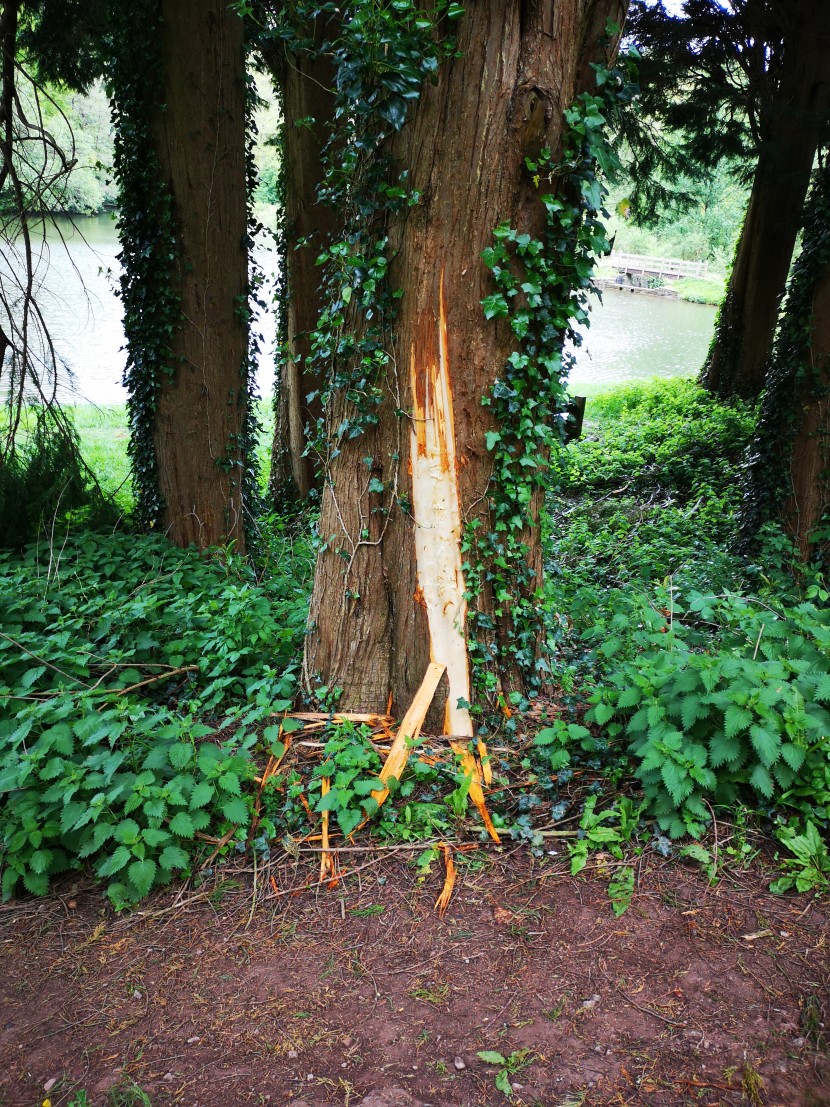 Antler scrape
Antler scrape  Wild pigs visit nightly
Wild pigs visit nightly Two. It’s an awful thing to remark, but recent lockdown regulations have risked making some of us feel like criminals. There is the matter of the “takeaway” or “click and collect” permissions while certain shops are closed to regular entry. Thus, having made the initial phone call or text, you skulk around masked in a side street waiting for a door to be opened and a box of cartridges or a pint of maggots to be handed out for cash. These transactions feel a bit like making a surreptitious delivery of illegal liquor to the back door of a speakeasy during American prohibition. And of course the masks themselves are interesting. Not so long ago we seemed to be having impassioned debates about whether orthodox Muslim ladies had the right to cover their faces while, for example, giving evidence in court. I’m not hearing too much on that subject lately. Well we are all covering up now, aren’t we?
Then there is the matter of border crossing, which at different time we have been told we shouldn’t do during lockdowns in one country or the other. However, in some rural areas like mine it is in practice almost impossible to avoid... to reach the supermarket, the garage or just cross to another part of the same nation. Many of us work across the border. My daughter, for example, commutes between Merthyr Tydfil and Hereford, although she has a military pass. The need for local people to cross is quite understandable but it’s a fact that motorists don’t particularly like the idea of explaining their mundane daily activities at a police checkpoint. This police checking has so far been intermittent and restricted to the trunk roads, but I know some border back roads which have never seen so much traffic. In Bosnian days I got quite used to the business of being harassed on the road variously by Croatian, Serbian or Muslim police, despite the fact that we were in white vehicles making humanitarian deliveries to feed a nation under blockade. From our point of view as internationals, rogue police armed with their lollipop “stop” signs looking to make trouble or for a bribe were then effectively one of the “enemies” hindering our work. Still, it was better to be dealing with unfriendly police on the checkpoints compared to distinctly more unpredictable soldiers or even a couple of drunk civilians with shot guns, as in the early days. After the Dayton Agreement it was a delight when driving a vehicle with CD plates to just blast through attempted checkpoints while wagging an admonitory finger through the windshield. Later I took an unholy pleasure in harassing them for such offences as wearing a side arm in the Zone of Separation.
This is a different situation; these are “our” police with whom we wish to have a good relationship and in this particular case we are not used to the border we live next to being watched. I support the lockdown measures in principle, follow the guidelines and take steps to protect those I talk to, but I believe it is best that the rules are administered with a light touch and very preferably with a unified four nation approach. A situation where two adjacent rural areas with very low infection rates are artificially divided could thus be avoided. As time goes on I find myself more and more in sympathy with retired Supreme Court Judge Lord Sumption, who feels that those most vulnerable (the elderly themselves) could be trusted to make their own decisions about how much risk they find acceptable as many of them wish to live a normal life with some quality to it. Lord Sumption quotes SAGE itself on this: “Citizens should be treated as rational actors, capable of taking decisions for themselves and managing personal risk.”
Which brings me on to another border which has been much in the news lately, and about which much nonsense has been talked. I’m referring to the Irish one, which is a border to be watched, but not guarded. While wrangling over the terms and intentions of the withdrawal agreement Michel Barnier declaimed several times that a border down the Irish Sea between Northern Ireland and the rest of the UK was “…the only way to protect the Good Friday (Belfast) agreement, guaranteeing peace on the island of Ireland.” We also had to listen to European journalists and politicians talking regularly about “trade between the United Kingdom and Northern Ireland,” when what they actually meant was trade between Great Britain and Northern Ireland. In summary, I’m getting a little tired of being lectured by EU officials about peace in Ireland, as if that were an EU achievement. With the single exception of the anti-piracy naval mission in the Indian Ocean, arguably there has never been a successful EU-led diplomatic or military peacekeeping operation anywhere. The early attempts to end wars in the Balkans during the nineties, initially left to Europeans with some back-up from the UN to resolve, were a signal failure. As I was on the EC payroll for some of that time I feel entitled to speak about this. I suspect the violence in Bosnia Herzegovina might have continued for many more years had President Clinton not finally lost patience after the 1995 Srebrenica disaster and initiated a 60,000 troop NATO-led peace enforcement operation. For those of us who had suffered under the previous weak international protection mandate, the deployment which followed, almost the full power of NATO in action, was a sight for sore eyes. Maybe Europeans just aren’t good at this sort of thing, better at starting wars than stopping them. Look at the record of the OSCE, whose own staff call it the Organisation for Spreading Confusion Everywhere.
It was inevitable that during the over-extended process of the UK leaving the EU various nations and factions would try to gain some spurious advantage for themselves out of the changes. Ireland is not the only land border if you include British Overseas Territories. Thus we have had to listen to some tendentious claims about new arrangements supposedly needed for Gibraltar and even the Sovereign Base Areas in Cyprus. There are some local discussions going on about Gibraltar and the Channel Islands. However, the idea that Brexit threatens peace in Northern Ireland is quite unrealistic, although so many in this country seem to have accepted that idea as a proven fact. “No hard land border in Ireland” is the cry we hear from all quarters! The new leadership of the United States certainly seems to believe that the peace has been threatened by the actions of the British Government. I am sure most Americans wish the peoples of Ireland all the best and a peaceful future, but you will forgive me if I haven’t forgotten the extent to which US-based Irish republican organisations like NORAID contributed to funding and increasing the violence during the ‘70s.
I don’t claim to be an expert on Northern Ireland during the troubles – my career took me elsewhere - but I do talk to people who were closely and personally involved with security in the province during the bad times, including one or two who still are involved. What I hear from them is pretty convincing. Their view is essentially that the success of the Good Friday Agreement is not due to the high profile individuals and politicians who often claim to have resolved the conflict: not to Bill Clinton or his envoy George Mitchell, grateful as we should be for their good offices, certainly not to John Major, Tony Blair or Bertie Ahearn, and even more certainly not to the European Union politicians who rather amazingly sometimes claim credit. It is to some extent due to individual Northern Irish participants representing the factions in the negotiations, but the real causes behind peace breaking out in Ulster are twofold.
The first reason for peace, obvious as it may seem, is that by 1998 all sections of the Northern population had become so exhausted by violence that there was no longer an appetite for more. This exhaustion and longing for a normal life is what usually ends civil conflicts sooner or later. The second reason, and probably the most important one, is that by that time the IRA was totally penetrated by British intelligence. When one in three of your organisation’s members is a paid informer, there isn’t much choice but to give up the military struggle, go the political route and make a deal. These two reasons remain equally valid today. We should have at least some confidence that whatever arrangements are made for the province in future, they are likely to be debated by local people and their representatives in the political arena rather than fought for with guns and explosives. Meanwhile, we shouldn’t worry unduly over statements made about the impact of infrastructure on the border; the infrastructure is already there and nobody has any reason to add to the numerous surveillance cameras which already exist, despite threats and promises recently made. We already know what crosses the border in either direction because the Northern Ireland border continues to be one of the most closely watched places on God’s earth.
After all the wild talk, has the interim agreement in principle for trade in Ireland announced this month by Michael Gove and Maros Sefkovic of the EU resulted in a loss of United Kingdom sovereignty? To an extent and particularly in the symbolic sense, I believe it has, and as such I regret it. Hardliners have remarked that the EU has “annexed Northern Ireland.” On the other hand and trying to be optimistic, it might turn out to be a pragmatic agreement using a “trusted trader” scheme, one which seems to have relieved the worries of Irish business, and one which even the DUP can live with. In the important case of checks on livestock health, it does seem sensible to treat the island of Ireland as a whole, and this hardly constitutes a border down the Irish Sea. Let’s see how it works in practice.
Three.“What is owned by all will be cared for by nobody.” You might describe that as the over-arching lesson to be drawn from the 20th century experience of communism. It applies equally to the EU’s Common Fishery Policy, which has proved to be disastrous to Britain’s fish stocks and fishing industry. Now that fishing methods have become so efficient, it becomes more important that stocks and the delicate marine environment are managed very carefully, and certainly with much more care than has been applied over the last 47 years.
Fish are not an infinite resource, even if we have been behaving as if they are. Even a period of lying fallow to some extent would be advantageous to our EEZ. Some, more concerned to resolve disputes with the EU about other sectors, like to point out that fishing profits are a relatively small part of the British economy. Currently they are a small part, that is true, although try telling that to the coastal communities who lost their jobs during the EU period. Edward Heath’s throwing open of our waters to European boats decimated the British industry. Now we have new opportunities and perhaps we should take a lesson from nations which have made a success of their fishing outside the CFP. Iceland is the obvious nation which has, species by species, carefully conserved, managed and improved to grow what is a very important industry for their economy.
Fishing is very important to Norway too, and the Norwegians have also been careful in exploiting their EEZ to the advantage of the environment and their economy. It is likely that one of the reasons Norway held back from EU membership was the demand to surrender their valuable fishing into the common pot. Control of fishing is symbolic of sovereignty, yes, but in Britain’s case there is much more to it than that. There is a chance to regrow our fishing industry over time, make some money by all means and provide some jobs, but above all preserve a quite delicate marine environment which has suffered from a long period of damaging neglect. Surely we owe that much to our children? Am I not concerned about the livelihoods of French, Dutch, Spanish and Portuguese fishermen? Well, to about the same extent as they showed concern for ours. Meanwhile hardliners in the British fishing lobby were querying why there was even discussion between the UK and the EU about a deal on fish, surely a natural resource, when the goal was supposedly a deal on trade and manufactures. Should we be demanding thousands of tons of Belgian coal in order for the EU to have tariff-free access to the world’s fifth biggest economy?
Still, you can’t always get what you want, as the song goes, at least not all at once. In the final days of 2020, supposedly in anticipation of a no-deal Brexit, EU factory trawlers were helping themselves (quite legally) to as much as they could before access to British seas might close. In late December the Dutch-owned Margiris, the world’s second largest fishing vessel, was trawling regularly from north of John o Groats round into the Moray Firth. And then on Christmas Eve the poker game with Brussels ended, as it was always going to do. The play acting was quite visible in the final weeks, including the timely deployment of the Internal Market Bill. It turned out the deal on fishing was the last part to be resolved. As I understand it, EU vessels in the short-term will continue to have access to British waters including the important 6-12 miles zone, but over a five year period from 15% to 25% of the current EU catch will gradually be ceded to UK flagged boats. After 5 years, quotas for foreign vessels will have to be negotiated with the UK on an annual basis, at which point, I suppose, we can at last claim to be genuinely sovereign over our waters. The Brexit process will by then have taken 10 years. We can be patient and I hope I am spared to see it. The British fishing lobby is much less than happy and with some justification, but that arrangement should surely result in planned growth rather than contraction of the industry in this country. At the same time the French fishing lobby also expresses dissatisfaction with the result, which at least indicates there is some kind of balance in the agreement. We can talk about shares endlessly, but let’s not overlook the fact that the waters have been overfished. The important matter now is that marine conservation in British waters is urgently addressed, during the next five years and beyond. Sea trout anglers will have particular reason to be concerned about that sensitive 6-12 mile zone and industrial fishing of sand eels. Meanwhile I’m raising a seasonal glass and making a New Year resolution: eat more sustainably produced British sea fish!
Four. There is a well-established tradition of making annual awards to people and organisations which have distinguished themselves, sportsperson of the year being the most famous example. In this last month of 2020, I am minded to propose two candidates. You may not agree with them, but here they are:
Principled Stand of the Year. To Dr Luke Martin, teacher of divinity, who resigned from a senior position at Eton College in protest at the dismissal of English lecturer Will Knowland. The last had refused an order to take down a U-tube lecture for Eton students referring to “current radical feminist orthodoxy.” Dr Martin’s point was not that he agreed with all Mr Knowland’s arguments, but that he had a right to express them and the students to hear them. Martin described Eton under its current leadership as “…moving to a point where it will be accurate to say that they are trying to indoctrinate their students into a progressive world view…There is a growing promotion of a so-called ‘progressive’ ideology, that claims to be inclusive, tolerant and kind. This ideology is, of course, present in other institutions. But what has dawned on me over the last few years is that it is remarkably similar, in a particular respect, to the forms of religious fundamentalism that I’m familiar with: if you disagree with it, you’re excluded; if you think differently, you’re not tolerated; and if you raise objections, you’re mocked or face formal discipline…I make a stand for my freedom to express information but also, and more importantly, for the boys’ freedom to receive it ” Dr Martin (who was raised in Northern Ireland where he states he acquired a certain experience of intolerance and religious fundamentalism) had been moved to wonder who might be next for the sack. More than 1,000 boys are said to have signed a petition objecting to “institutional bullying.” Good for them. Eton parents, I gather, are now expressing some concern. I’m not surprised. We used to pride ourselves on our freedom of speech in this country. Do we still have it, I wonder? I had an interesting conversation the other day with a young Hungarian who has lived and worked in the UK over the last few years. “I knew I didn’t have freedom of speech at home,” he said. “Now I’m not sure I have it here.”
As a footnote, I’m reminded of my own school in the early sixties, where a new and much-liked young history teacher from the North suggested to his class that as pupils were concerned about some trivial matter (something to do with the playground as I recall) they might present a petition to the authorities about it. The result was that the young teacher was sacked, and the whole school was called together and harangued furiously by the headmaster who was apoplectic with rage about the affair. His message, delivered literally with a certain amount of spittle, was that pupils were at school to learn their lessons and do what they were told, not sign petitions. The meddling of an “inexperienced teacher” was of no account he told us. Somewhat ironically, a couple of years later the same headmaster was quietly retired early, according to rumour for sexual molestation of boys. They handled such matters differently in those days.
Media report of the year. This goes to France 24 for their team’s filmed report on the aftermath of the Nagorno Karabakh conflict between Armenia and Azerbaijan, and the subsequent peace deal brokered by Russia and Turkey. What the team revealed, very unusually and movingly, is what actually happens when territory changes hands and a population feels that is forced to move. So the camera shows us an Armenian man, about to leave his home, setting light to the interior with a torch. When wall hangings and curtains are already in flame and pouring smoke, he walks out through the door, stating “…let them live in it if they can.” Meanwhile, in a nearby grave-yard, another man with a friend is digging up the corpse of his father. “We have to do this,” one of them says. “They will be here tomorrow. We can’t leave our dead.” A pickup truck stands waiting to carry the coffin away. A couple of days later, the same crew manages to film newly arrived Azeri soldiers giggling as they push over and smash Armenian grave stones. We don’t need a voice-over to tell us what would have happened if the Armenian population had tried to stay.
Such scenes have rarely been filmed, but they have been happening since the beginning of human history. The massive exchange of population between Greece and Turkey after the Treaty of Lausanne in 1923, forcibly sending Christians to Greece and Muslims to Turkey, involved more than 2 million people and was overseen by the polar explorer Nansen on behalf of the League of Nations. The movement caused immense suffering and an ending to ancient cultures; Greeks had lived in Asia Minor for thousands of years; Turkish Muslims had lived in Greece for centuries. Businesses and valuable estates would be lost for ever. It’s recorded that most refugees trashed their property before leaving and even doors and window frames were carried away. The politics of Greece and Turkey would be affected through most of the 20th century. Almost nobody can be still alive who remembers the disaster, but I can recall hearing old men in the southern Turkish port of Antalya speaking Greek to each other, because they had been born in Crete and Greek was their first language.
History repeats itself again and again. The massive displacement created by two world wars and the Soviet Union’s brutal internal exile of whole nations to Central Asia are well documented. Two million people were displaced by the Bosnian war of the 90s. At the time of the Dayton Agreement in late autumn 1995, Nerma and I were living and working in the Bosnian town of Gorazde. Of the three Muslim enclaves in the east of Bosnia, while Srebenica and Zepa had fallen to Serb forces during the summer, Gorazde had held out, although it was touch and go for a while. We watched the announcement of the Dayton Agreement on the satellite television in the UN Civil Affairs office and there was a round of applause when we saw that a narrow corridor of land had been awarded connecting Gorazde with Federation territory further west. Gorazde, packed for nearly 4 years with displaced Muslims from the surrounding towns and villages, would no longer be cut off inside enemy territory, as we inevitably viewed the situation at the time. There was no road through the corridor, which was mostly mountain and forest, but British forces would work rapidly to build one.
Just one ethnic Serb village stood in the treaty re-allocated territory for the corridor, quite close to the ceasefire line with Gorazde. Shortly after the announcement, the Gorazde mayor, Brian from Civil Affairs, Eddie from UNHCR, representatives of all the international NGOs, the French guys from ICRC, a whole cheery Christmas bunch of us in fact, took to the icy road in our cars, passing the front line where until a few days before we had needed to pull a row of anti-tank mines aside from the scarred tarmac to drive across, and paid a “friendship visit” to the Serb village. Over coffee we assured the leaders of this little community that they would be secure, that there were no bad intentions towards them, that they would be correctly treated by the Bosnian government and that the same aid programmes targeted at Muslims in the pocket would be offered to their people. This was not idle talk; I was already negotiating to provide assistance for Serb schoolchildren in nearby Rogatica and Visegrad. The Serbs were very polite, thanked us kindly for the assurances, shook our hands and waved as we went back into Gorazde through the snow. Early the next morning they set fire to their houses and left their village, moving just 4 miles down the road into territory controlled by their own authorities. Here they moved in with friends or camped in barns and school classrooms. The village was burning for three days; you could see the smoke from my office. There are references to this sort of thing in Balkan folkloric sayings: “The Serbs always come back to their ashes.” It didn’t turn out to be true in that case. Or, on the supposed intelligence and cunning of Croats: “If you see a Croat burning his house, burn yours.”
For me, Al-Jazeera would have run France 24 a very close second for the quality of its international news. Sad to report, the BBC devotes less and less of its resources to international reporting these days, although the efforts of experienced journalists like Middle East Editor Jeremy Bowen have to be admired. Sky seems to have moved in the same direction. Instead, our domestic media outlets give the impression of devoting 90% of the time to interviewing people unhappy with the management of the pandemic and maybe the remaining 9% to those frightened by Brexit, with just a little left over for US elections. A whole world out there is being ignored by the main channels, although I am not sure if the companies themselves or the parochial interests of the modern viewing public are to be blamed.
 Withering letter about fishing technique of Prince of Wales
Withering letter about fishing technique of Prince of Wales Five. Somebody sent me the clipping opposite the other day. The words speak for themselves. Judging by the font, Mr Witherow’s letter (let’s think of him as Appalled of Woking) was published by the Times. I do sympathise with Mr Witherow, but the problem, you know, is that modern actors can rarely fish. The days of Michael Hordern are unfortunately gone, although of course Bernard Cribbin is still with us.
This is compounded by the fact that screenwriters think that their heroes, particularly those of detective thrillers, certainly should fly-fish in their spare time. For the writers, it seems a suitably intellectual interest for their character to have, for which I suppose we anglers should be flattered. All the same, I don’t think much of the fishing techniques on display in either Inspector George Gently or Foyle’s War. I suppose the budgets didn’t run to getting a professional in to fake the casting or at least give the actors some coaching. So do we think The Crown treated Prince Charles unfairly? Now I really shouldn’t divulge this next part, but the temptation is too great. I once talked with a gillie (sadly no longer with us) who on a certain occasion took out Prince Charles with a two-handed salmon rod. No salmon were caught from the Usk that afternoon, but three trout decided to attack the fly and were duly played in. “Never mind,” said HRH, “it’s been a lovely afternoon and the three sea trout were nice.” My interlocutor then put on a conspiratorial air and whispered to me sotto voce: “But the thing is that they weren’t sea trout at all. Just ordinary silvery coloured Usk brownies. It bothers me that our future monarch wouldn’t know that.” I had to ask: “Did you tell him?” “Good lord no, not for heaven. I wouldn’t dare.”
Ah well, now I have told the story and bang go my chances of a knighthood. On reflection, I have reason to believe that Prince Charles actually does know what’s what when it comes to fishing. The firm of Hardy is said to have offered Charles and Diana a choice of wedding presents to recognise the royal couple’s marriage. Princess Diana opted for a 12 or 13 foot double-handed salmon rod; I don’t know if she ever used it. Prince Charles, on the other hand, asked for a pair of Model Perfect reels, one trout size and one salmon, and these were specially acquired, reconditioned and presented to him. Now that was pretty canny of HRH in my view; could you have made a better choice when presented with such a glorious opportunity?
Oddly enough, despite the problems created by the pandemic this year, there is one very good reason to be cheerful at the moment. I have never experienced such a strong interest in angling on our rivers and lakes; much of it has come from clients who have never fly-fished before and particularly from young people. While there was no possibility of work for guides and instructors during the weeks of the spring lock-down, there was a tremendous demand later in the season and I am still getting daily inquiries, even in the depths of the winter. WUF inform me that they expect to log record sales figures for fishing tickets, and Sportfish have acquired no less than 8,000 new names on their database since the beginning of the year. All this bodes well for the future of the sport.
Finally, here’s a Christmas story from the Forest of Dean. There’s a large and close family known to us who all still live and work in the town. This jolly tribe has a grandmother, recently widowed now and somewhat suffering from dementia, who stubbornly insists on living alone in the patriarchal council house. In normal times, they used to have her in turns for Sunday lunch. Given the Covid virus regulations, what to do for the old girl at Christmas time? Somebody in the younger generation had the bright idea that they would stand in the garden with candles, separated in approved groups of six and regale her with Christmas carols, “just to show her she ain’t alone like.” They had got through God Rest Ye Merry Gentlemen and were started on Good King Wenceslas, when an upper window opened and a voice shouted: “I’m trying to watch East-Enders here. If you lot don’t shove off pretty smart, I’m going to sprinkle a hot kettle over you.”
Oliver Burch
